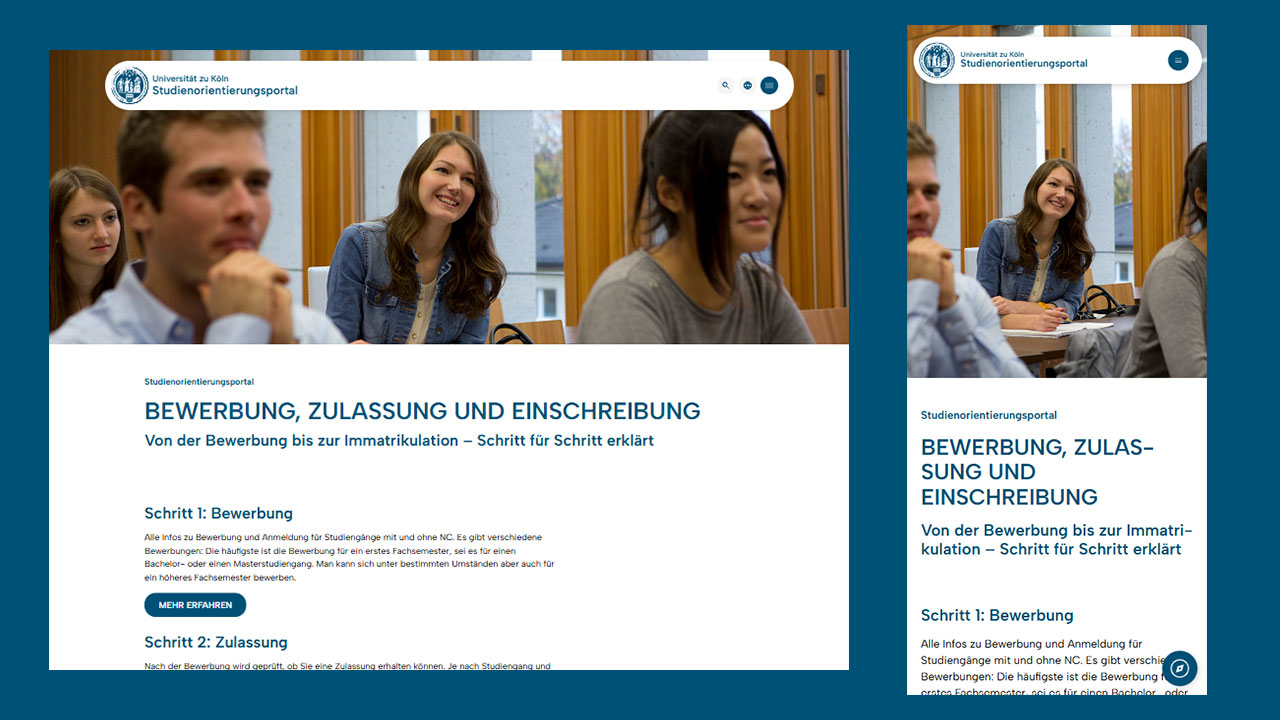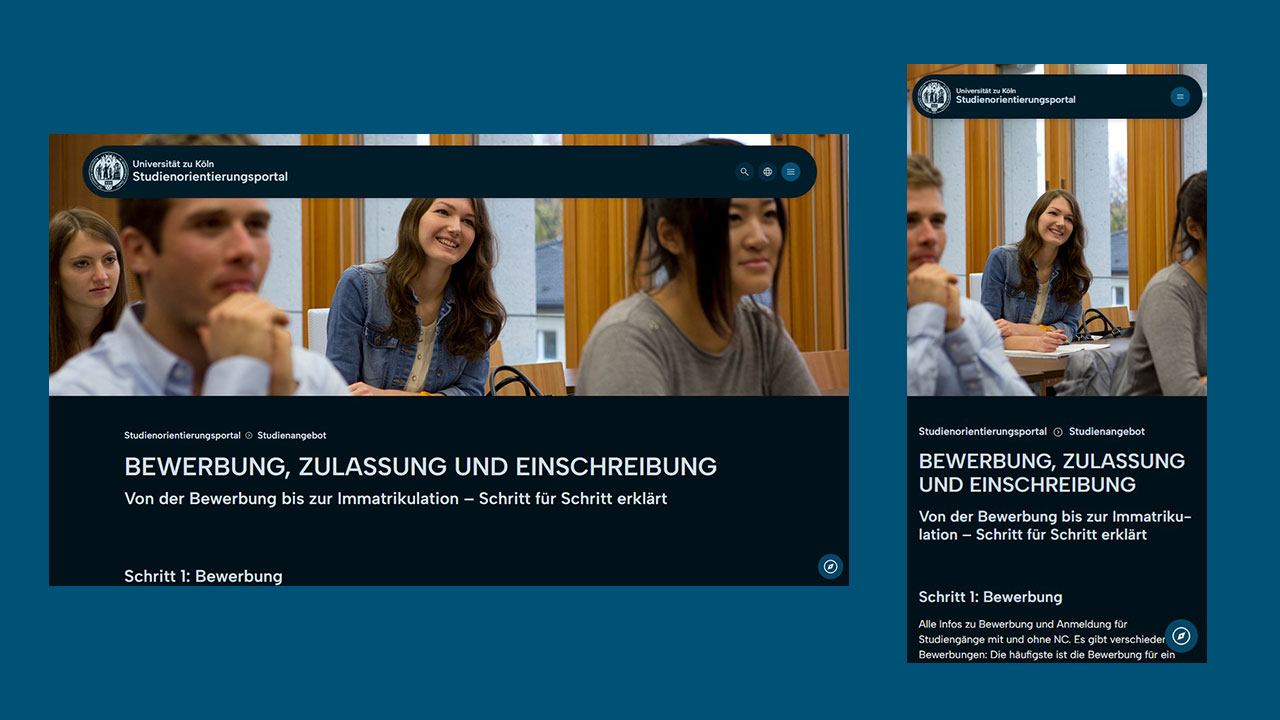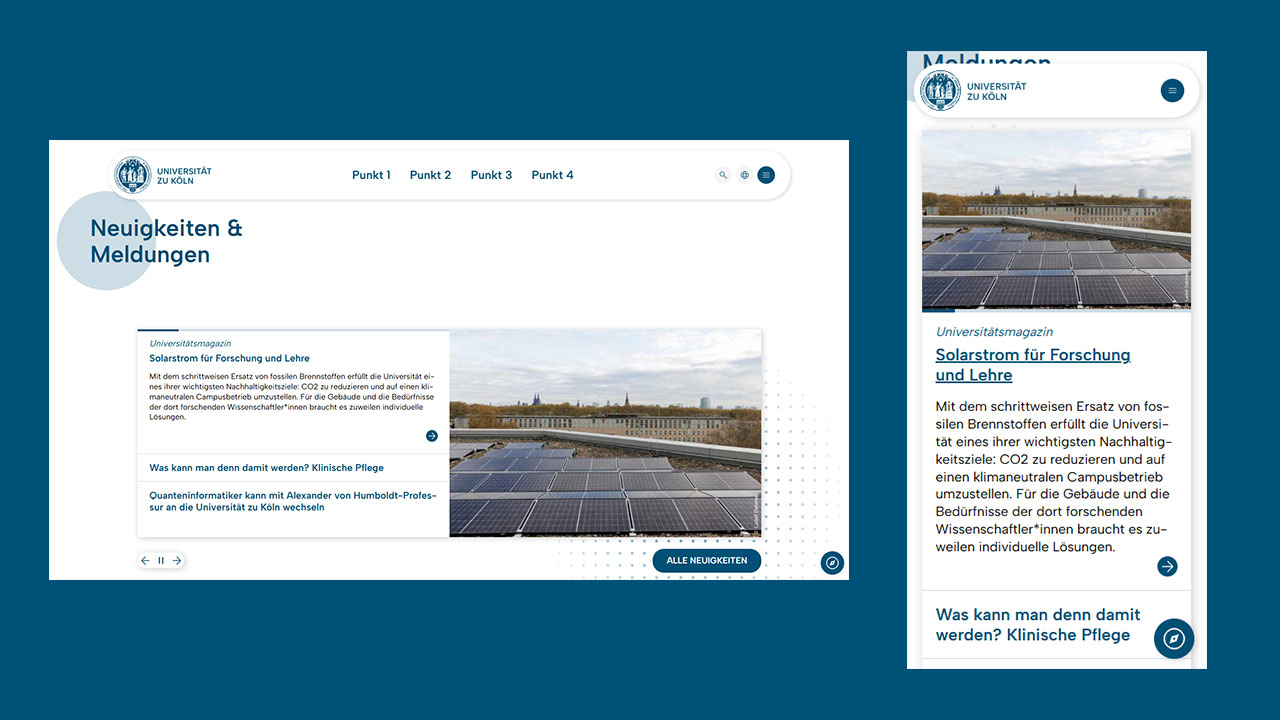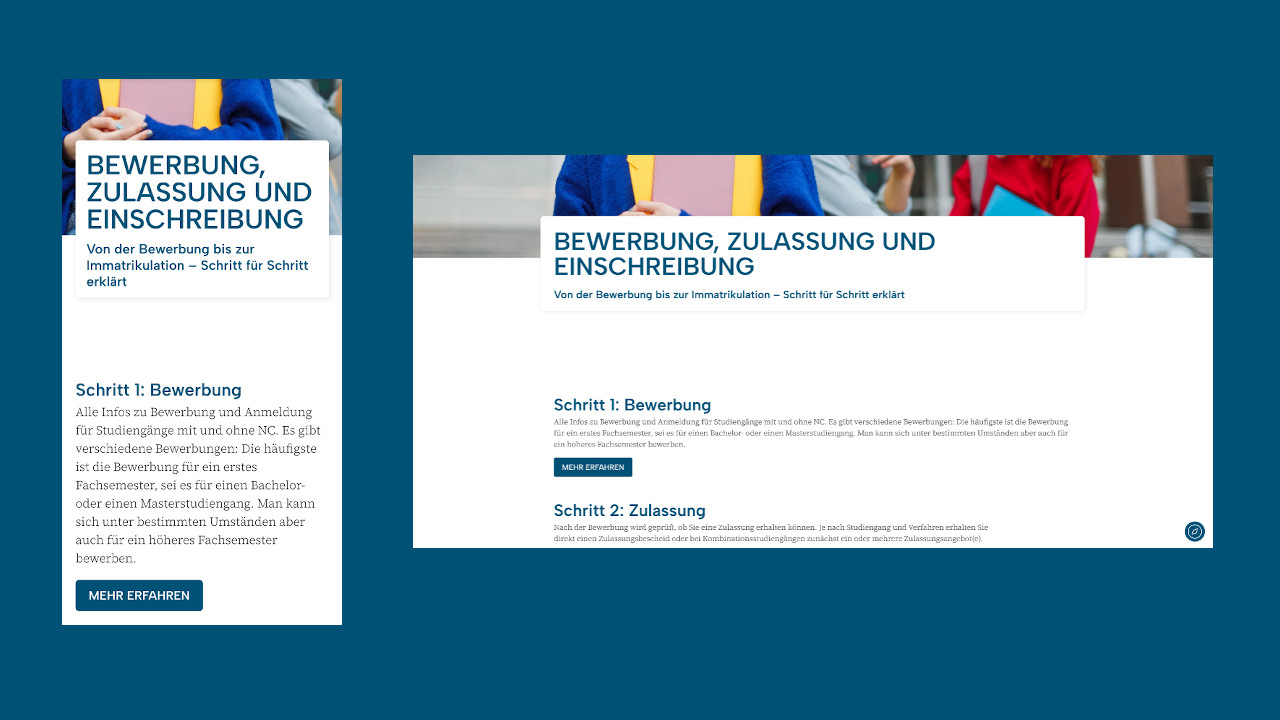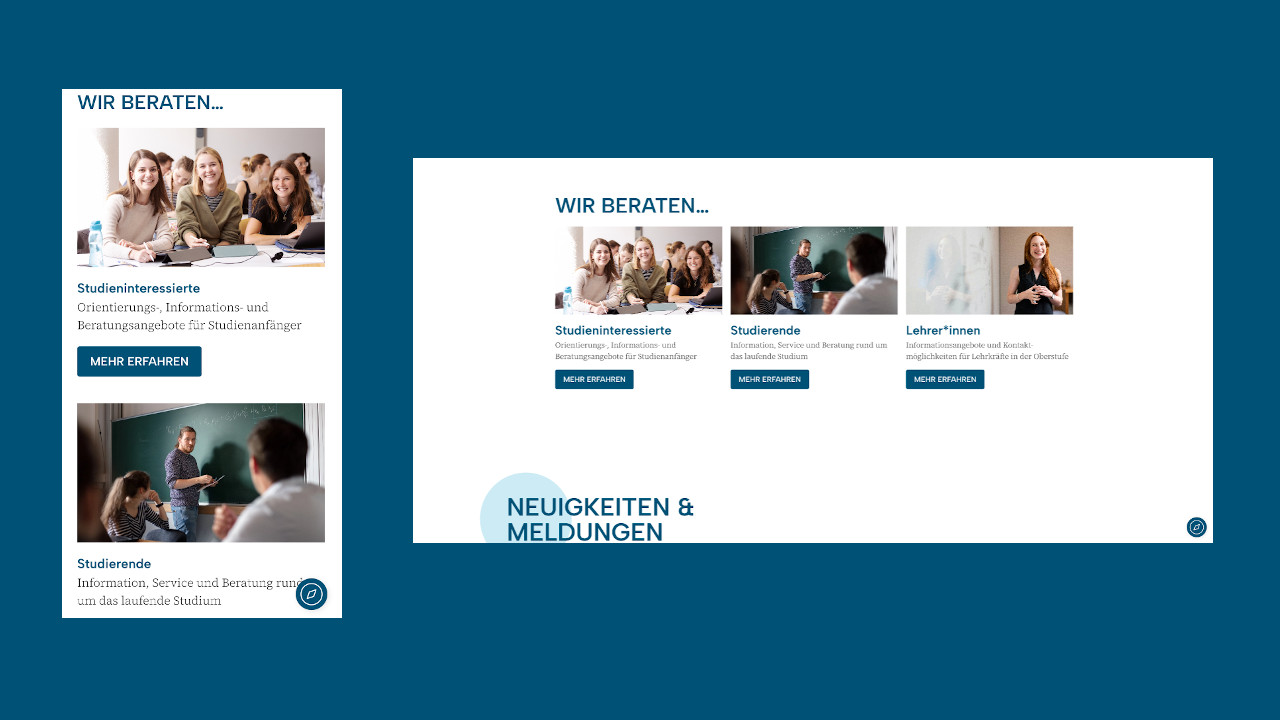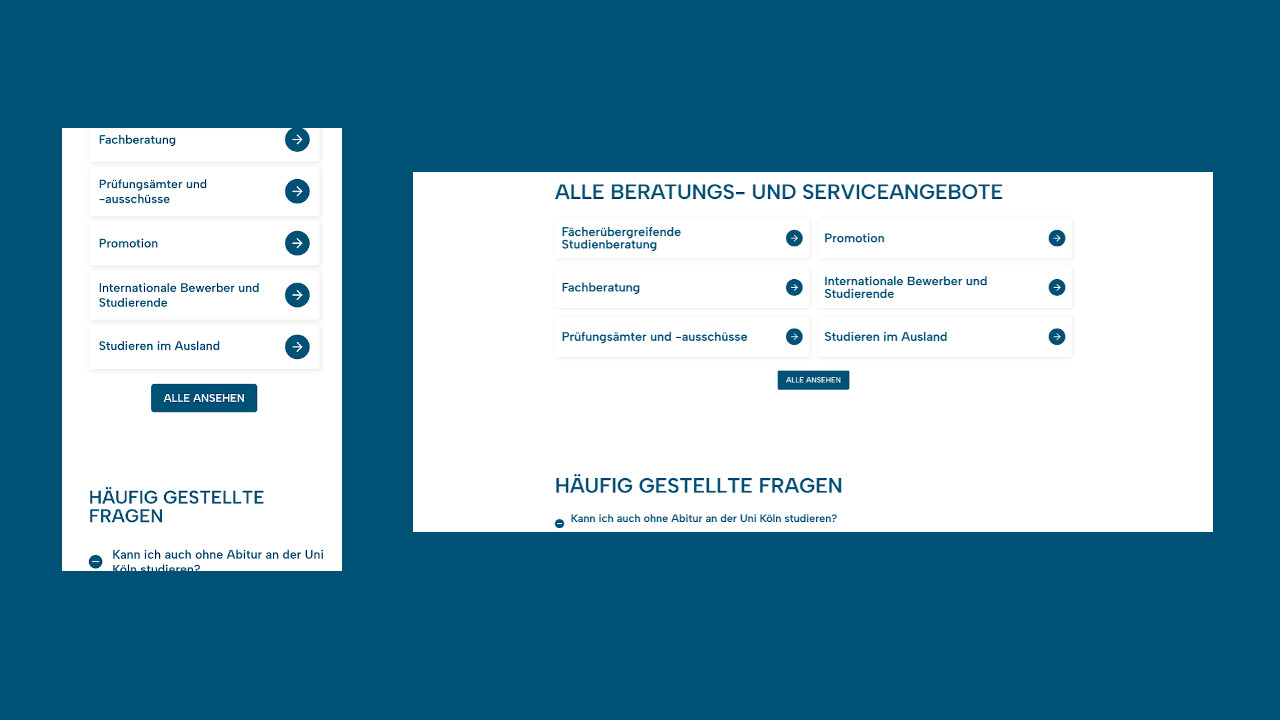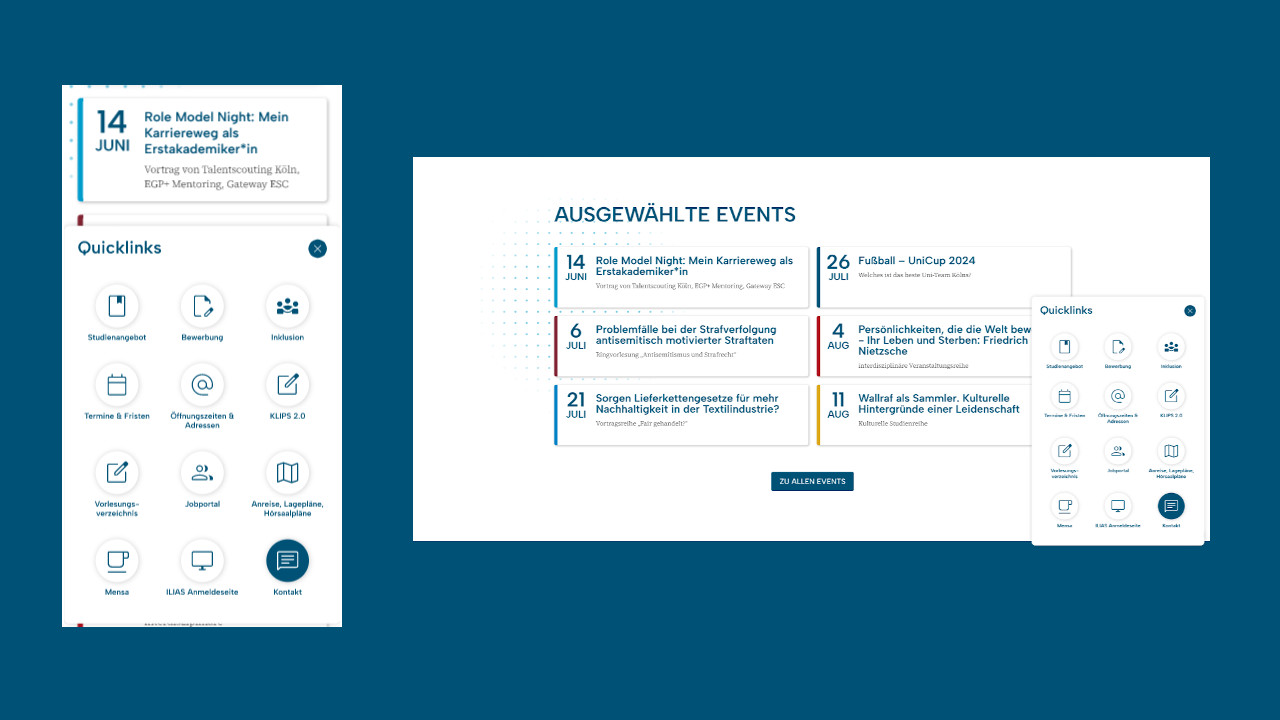Welcome!
To get started with the project blog for the web relaunch 2025, let's take a look back: In its strategy meeting on 22 July 2022, the Rectorate set the course on how to revise the websites of the University of Cologne. Key project objectives are derived from the following meeting excerpt:
“With the new web relaunch, the online communication of the University of Cologne will be restructured. It should focus more consistently on the information needs and digital usage habits of its target groups. The websites should consistently support the strategic orientation of the university, also with regard to the Excellence Initiative.”
This was followed by the preparation of the project including the advertisement of the positions in the project core team, the induction and the project initial phase with many discussions on the topic of web presence. Now it's time to get serious! This blog will inform you about the latest project news. But first, here is some information on the most important questions.
Enjoy reading.
The core project team
What?
Who?
How?
When?
Blog posts
Preparations for the migration to the new design
As part of the web relaunch project, the University of Cologne’s websites will be gradually migrated to the new web design starting in summer 2025. Web editors can get started in advance to achieve the best possible presentation result. The redesign will have a new look, which is based on the overall layout, additional website modules and the redesign of the individual content elements already in use.
In this post, we will introduce you to three key innovations in web design and explain how you can prepare for them.
Focus on the ‘main content’
In the new design, it will no longer be possible to place website content to the right of the main column (‘main content’). If important content that you want website visitors to see quickly is stored in the so-called ‘sidebar’ (German: Marginalspalte), it is best to move it to the desired position in the main column now. If you do not change anything until the relaunch, the content will not be lost, but will be listed under the main column's content.
New main navigation layout
In the navigation area, the items on the first level (below the homepage of a website) will be displayed below each other instead of next to each other. If possible, choose short page titles for the new design to help users find what they are looking for.
Future standard image formats
The following standard image formats are provided in the redesign: 16:9, 3:2, 2:1, 5:4, 2:3, 1:1. However, other image formats are still supported. Depending on the element used, you can edit your image selection. For example, an aspect ratio of 3:2 is recommended for the illustration of a news article. In addition, image formats in teaser tiles should be adjusted where possible so that the same aspect ratio is always used in landscape format.
Generally, please ensure that uploaded images are not too large, in order to reduce server resources, data volume and loading times.
Do you have any questions or comments about the project? Click here for the contact details of the core team of the web relaunch project.
Tidying up for the migration to the new web design: Digital Cleanup Day as part of the web relaunch
Digital Cleanup Day is on 15 March – a call to action to get rid of digital waste in order to save CO2 and also create more order and clarity. Check out the website of the University of Cologne’s Sustainability Office for more information on Digital Cleanup Day.
‘Digital waste’ can accumulate not only in your email inbox and on your local hard drive, but also on the server on which your website is hosted. In view of the upcoming migration to the new web design starting later this year, it is all the more important to clear out outdated content.
Inspiration for web editors on how to tidy up
In the project groups and in individual consultation meetings, the web relaunch project team suggests the following for easy navigation: a maximum of six sub-items and the reduction of navigation levels. This may sound contradictory, but both can be achieved by reducing redundancies, summarizing websites, streamlining and simplifying texts and deleting outdated, no longer valid content and document links.
Web editors can place direct links to the most important seasonal or general content on the subpages. On subpages, ‘skip navigation’ links help to find the desired content more quickly.
With regard to multilingual content, it is important to ensure language consistency and that the content in each language is on separate (translated) pages. You can find support on the website of our central translation team and in the notes on multilingualism in TYPO3 and in ZMS (in German).
In addition to saving server storage space and data volume, clean-up campaigns ensure that content is kept up to date, only valid information is published and users – both external and internal – are given a better overview. This can help to make working easier and reduce the workload. Editorial plans can be useful to schedule regular checks for updating and deleting content.
What needs to be considered?
Before content is deleted, it is necessary to check whether it is really no longer needed, whether it can be updated or needs to be archived. The legal requirements for deleting and retaining data in public sector institutions like our university must be observed. You should also consider your target groups and their information needs.
Do you have any questions or comments about the project? Click here for the contact details of the core team of the web relaunch project.
Handover of the prototype to the University of Cologne
A milestone has been reached: In the next few days, the agency will be handing over the prototype of the new web design. The university’s web developers can then integrate the new web design into the university’s major content management systems (CMS). This means that they transfer the code created by the agency into the CMS-specific programming frameworks or translate it for them.
Once the design is integrated, the migration of existing websites will follow.
The next step, which is planned for the 2025 summer semester, will be to prepare the migration of the university’s central pages – i.e. all websites listed at www.uni-koeln.de and verwaltung.uni-koeln.de. Not only the web developers and administrators, but also the numerous web editors are called upon to prepare their websites for the transition to the new design and to check for any adjustments that need to be made. They will be advised by the project team and supported with appropriate training material. In autumn, the university’s central websites will be available in the new design.
Speaking of the new design: A few things have changed since the last sneak peek – for example, the sans serif font that users preferred in the user testing has been implemented and the interaction buttons have been rounded off.
Have a look at the new design. It is light and airy – but will also be available in dark mode in the future.
Do you have any questions or comments about the project? Click here for the contact details of the core team of the web relaunch project.
Review and outlook on the user testing and implementation
At the end of October, volunteer testers had the opportunity to test elements of the new design for usability. Everyone was invited to take part – both university members and external parties could participate anonymously in the online survey at the Regional Computing Centre. The campaign was advertised in the internal employee mailing ‘expresso’ and on the university’s website and Instagram channel, shared by various Faculties and institutions.
The user testing focussed on the typography and the main navigation elements of the future University of Cologne’s website. The result of the typography-related questions confirmed the project committees’ suggestions that a sans serif font is better than the proposed serif font for text sections. For this reason, the project team asked the agency to adapt the design of the prototype accordingly.
There was qualitative information on the main navigation that revealed the different users’ preferences. Overall, the main navigation performed well, particularly in terms of visibility and clarity. Detailed adjustments to the prototype are currently still being implemented. The results showed a trend towards moderate use of a new feature, the placement of popular topics and recent news in the fly-out navigation area. The project team will therefore formulate editorial guidelines and recommendations for using this new editorial option.
As the project progresses and after the planned go-live in autumn 2025, we will consider carrying out in-depth testing or testing structural and content-related aspects.
We would like to take this opportunity to thank all the volunteer testers for their valuable contribution to this project!
Accessibility audit conducted by the agency
In addition to general usability, the web design must also ensure that the website is as accessible as possible in the future. This is one of the tasks of our agency partner in2code. Our colleagues check the individual web design elements for accessibility during the ongoing implementation process. In this way, requirements are identified directly during development and the prototype can be adjusted accordingly.
Web developers at the university give feedback
The web developers of the two major content management systems (CMS) TYPO3 and ZMS have been part of the extended internal university project team right from the start. Together with the developer and administrator of the CMS Autoedit at the Media Network Center of the Faculty of Human Sciences, they were recently given a comprehensive insight into the agency’s implementation process. The close exchange among the various web developers and the agency should also help to integrate the existing content and to ensure that the new web design can be realized by the university.
Do you have any questions or comments about the project? Click here for the contact details of the core team of the web relaunch project.
Now it is up to you: user testing starts
The web relaunch project has entered the next exciting phase: The prototype of the web design will be implemented. This means that the design developed so far is ‘translated’ into the markup and programming languages so that your browser can display the website in its new look. The prototype created can be used to test variations or functions in the design.
We are therefore using this opportunity to test the typography and main navigation elements: During user testing on Monday, 28 October 2024, volunteer testers can visit the prototype website and complete tasks and and answer questions at a PC workstation. You can take part, too! Click here for the details of the user testing date. However, please note that the prototype and instructions will be available in German only.
What happens to the test results
Participants are given an exclusive insight and can share their impressions as part of the survey. Thanks to the digital recording of the test results, the survey can be analysed quickly. Based on the results, it is then decided which variants of the test items will be implemented. We will be sure to let you know in the next blog post how this affects the further design implementation.
At the same time, the agency is currently working on the implementation of all other design components of the University of Cologne’s future web design. The final design will also be tested for accessibility before it is handed over to the University of Cologne for implementation.
Do you have any questions or comments about the project? Click here for the contact details of the core team of the web relaunch project.
Fine-tuning the design via user testing
Since the last blog post, the future web design has been further developed by being customized in detail and applied to additional content elements. Last week, the time had come: The agency in2code presented a series of draft designs for the future websites to the steering committee for approval. The drafts for the central university website as well as exemplary Faculty, institution and institute websites contain the design approaches for the navigation and orientation concept, the corporate design and the combination of content elements that are as accessible, user-friendly and attractive as possible. With the final feedback from the application group and the steering committee, the prototype of a future website will be implemented over the next few weeks – in other words, the digital, interactive preview of the future web design.
User testing in October
This preview can be used to test aspects such as font sizes and types, image formats or interaction effects for usability before making a final decision. Volunteer testers can try out and rate the HTML views and answer questions about their visit to the website.
The user testing of the prototype is planned for the first weeks of lectures in the winter semester 2024/25 – we will let you know about the details in the October blog post. The campaign will also be communicated through the University of Cologne website and social media posts. If you would like to gain a deeper insight into the future web design of the University of Cologne and contribute to its final fine-tuning, you should come back here in October. The feedback from the user testing can then be incorporated directly into the web design development and the agency can continue with the implementation in the HTML prototypes.
Update on 14.10.2024:
You can now find information about the user testing planned for the end of October on this page.
Do you have any questions or comments about the project? Click here for the contact details of the core team of the web relaunch project.
Insights into the ongoing design phase
After extensive preparation, analysis and concept work, we can now offer ‘something for the eye’: The agency in2code is currently working on the future web design of the University of Cologne’s website. What will it look like? We are happy to provide a little insight to satisfy at least a little curiosity. Please note that these are not the final designs.
From ‘look and feel’ to the final web design
In early summer, the steering committee assessed three variants of a mood design developed by the agency in2code, which conveyed different moods – the so-called ‘look and feel’. One of these variants served as a basis for the final web design, with aspects and components from the other drafts incorporated to reflect the diversity of target groups and content.
In order to take into account the feedback from the steering and users committee, it was harmonized with the goals from the concept phase in the course of the further development of the final draft. Some of the aspects to be included in the design were:
- aspects of accessibility and usability
- intuitive navigation elements to help guide different target groups
- modern yet timeless design with white space and large content areas
- incorporating the corporate design to strengthen the university as a brand and achieve cross-media recognition value
- a structured and vibrant appearance, using the University of Cologne’s colour scheme in a discreet but concise way.
- a focus on content by using large content elements and simplifying the website structure
- different variants for the most visible areas, adapted to the content and to be able to place high-quality image material appropriately
- smaller content elements and different image formats for the content area
Creating a coherent overall design is a balancing act that the agency performs in close collaboration with the project core team and in accordance with repeated feedback from the project committees.
Upcoming tasks regarding communication and editing
Will the go-live of the central university site planned for the end of 2025 just be ‘new wine in old bottles’? Not at all: In order to get the website ready for the relaunch, it is necessary to check if the existing structures and content already meet the principles of the future website or if they need to be revised. Although the future web design should be able to display existing content correctly, the relaunch is the perfect opportunity to optimize your own website.
In principle, the content and structure can be adapted at any time, ideally from the next winter semester until summer 2025 - or even longer, depending on migration planning. This process is actively supported by the project core team in terms of design and procedure. There have already been many discussions with those responsible for communications and web editors so far. The project core team will offer further appointments. If you have any questions, please feel free to contact them via e-mail: uzk-webrelaunch@uni-koeln.de
User testing is expected to take place in October. More to come in the next blog post.
Click here for the contact details of the core team of the web relaunch project.
The information architecture as a basic framework
How can information be located and linked on a website so that visitors can find it quickly and intuitively? How can the overall concept of information distribution be designed in such a way that it supports a positive user experience (UX)? We are currently addressing these fundamental questions as we develop the information architecture (IA) of the University of Cologne's future website.
Implementation of the project principles
One of the project's stated objectives is to focus more consistently on the target groups’ needs for information and digital usage habits. The project principle ‘orientation and navigation’ defined in the concept phase is particularly important for the design of the IA: Main navigation points should be reduced as far as possible, with the central university homepage serving as a guiding example in the future. However, topics should also be consolidated into a clear number of points on the page levels below and the page depth should be kept to a minimum. The additional principles of ‘focus on target groups’ and ‘clarity’ should be reflected in the various navigation elements and by using target group-specific terms.
In order to find a way to implement these principles, the project group focused and exchange ideas on the topic of site structures during its meeting in June. The next steps are the internal dispatch of an editorial guideline on IA and the development of site structures.
The connection between structure and design
However, successful user guidance depends not only on the IA, but also on a web design that supports usability: The navigation elements – from the main navigation to quick links and target group navigation to links in the content area – must be designed in such a way that they grab the user’s attention and provide guidance rather than confusing them. The website must be as accessible as possible and at the same time visually appealing.
In order to obtain indications for the future web design, the agency in2code developed three variants of a mood design for the central university homepage based on the previous input and presented them to the steering committee at the end of June. The feedback is used to develop a design that will be used as the basis for the actual design. In mid-July, the users committee will be able to provide more detailed information on the development from a user perspective.
One more note on user testing:
Recently, we have been receiving a lot of questions on this topic. Just to be clear: User involvement in the testing process is planned. As soon as the tests make sense and are technically possible, we will let you know in a blog post. You are welcome to send us your comments and questions about the web relaunch project of the University of Cologne at any time. Click here for the contact details of the core team of the web relaunch project.
Enabling participation on the web
In the web relaunch design of the University of Cologne, we pursue a series of principles that should make the website more user-friendly and minimize barriers to access. The users – in addition to the visitors to the website, also the employees ‘behind the scenes’ – should be the focus.
Accessibility on the web is not a trend ‘buzzword’, but a prerequisite for participation and equal opportunities: Relevant content should be accessed flexibly in order to enable all users to use the website and to be active independently. Therefore, there are legal requirements to achieve accessibility in the public sector.
Considerations in the redesign process
In the redesign process, accessibility starts not only with a technical check before going live, but already in the conception phase. For example, colour contrasts and readability are tested during the design phases, and in the early implementation phase, an HTML prototype is used for usability and accessibility testing. This allows feedback to flow back into development at an early stage. Through a subsequent audit (technical term for ‘testing’), the degree of accessibility of our future web design can be checked and further optimized. The latter will be carried out in close cooperation with the agency during the design implementation phase.
Internal input and implementation
The continuation of the university-internal workshop series ‘digital accessibility’ in the summer semester 2024 has once again highlighted important accessibility aspects. The participants of the project group ‘Accessibility, SEO & UX’ had already given important information on the design of a mostly accessible website at the beginning of the project participation phase. Since then, this aspect has been repeatedly taken up when discussing the design of content and design elements. The spectrum of possible measures ranges from the use of ‘plain language’ to the mostly accessible use of media to the overall concept of user guidance on university websites.
We use technical and design means to implement accessibility when redesigning. In addition, the editorial team is in demand to prepare content in a well-structured manner and as accessible as possible. How this can be achieved will also be the content of the future training offered. It is up to us to represent the university’s inclusive values by making its websites even more open and accessible.
Strategy concept takes shape
Over the past few weeks, our heads within the agency and the core team have been spinning: with the input of the steering committee meeting just before Easter, the strategy concept has been developed since the start of the new semester. The document contains the results of the various key areas of analysis, the framework conditions, the principles and the goals of the web relaunch. Based on this, variants of the navigation concept and the placement of study-related information have been developed.
Focus on target and user groups
The different variants were discussed in detail at the third steering committee project meeting at the end of April. The need for a stronger target group orientation in the navigation concept and site structure was repeatedly pointed out.
- A clearer main navigation,
- tidy entry pages with attractive content,
- intuitive quick links and
- additional user navigation
will help users find the information they are seeking more quickly in future. At the same time, the university’s profile will be sharpened.
We, the core team and the agency, received valuable input that will allow us to finalize the strategy concept.
Further development and launching the design phase
By the time the users committee meets in mid-May, the variants discussed will have been further developed. This will provide the basis to outline the deeper levels of the central website. A further meeting is planned for the project groups responsible for the pages of specific organizational units. At this meeting, the respective site structures will be examined together and recommendations for future content structures will also be derived on the basis of the strategy concept.
At the same time, we are moving towards the next project milestone: the creation of a new web design for the University of Cologne website. As a first step, a mood design is being developed to convey the ‘look & feel’ of the new design.
You are welcome to send us your comments and questions about the University of Cologne's web relaunch project at any time. Click here for the contact form of the core team of the web relaunch project.
Interim report with first milestones
We would like to take stock of what has been happening recently: The first milestones presented in the last quarter of 2023 have been achieved. The tender and selection of an agency for the redesign and internal requirements analysis have taken place. The setting up and implementation of extensive project work has enabled different perspectives to be examined and shared goals, target groups and approaches to be recorded. For the second users committee meeting, the project core team summarized the analysis results and reviewed them for decision requirements.
Entry into the strategy and concept phase
The commissioned agency in2code has evaluated the internal analysis results of the university and expanded them with its own data-based evaluations. The strategy and concept phase has begun with the kick-off workshop of the project core team and in2code. At the second steering committee meeting at the end of March, the communicative and strategic goals concerning the University of Cologne’s web presence were recorded. These are now to be elaborated in a detailed concept paper. At the third steering committee meeting at the end of April or following this, this ‘roadmap’ is to be discussed and a decision is to be made on this. In order to underpin the concept, first implementation variants as well as the future site structure and the navigation concept will be presented.
Outlook on the next steps
The strategy and concept phase ends with the acceptance of the concept paper. Immediately afterwards, the design phase will begin. Once the design is implemented as a web design, it is handed over to the project core team. in2code is expected to present the redesign in a ‘train the trainer’ training session by the end of 2024. While the university is migrating to the new design, the agency is still available during a support phase.
You are welcome to send us your comments and questions about the web relaunch project of the University of Cologne at any time. Click here for the contact details of the core team of the web relaunch project. Come back next month to stay up to date.
Agency starts work
Following the publication of the call for tenders at the end of 2023, and after a tendering process that lasted several weeks, an agency has now been selected. It will start working on the web relaunch project this month: The renowned TYPO3 agency in2code, based in Rosenheim, Bavaria, will develop the redesign of the University of Cologne’s websites. It will cooperate closely with the project core team and other project committees so that the guiding principles and objectives will be implemented.
Expertise with university websites
The new project partner not only has extensive expertise as a certified TYPO3 agency, it also has a lot of experiences with extensive web projects for many universities. Understanding the structures and processes within the university is essential for the success of the project. However, we expect an approach that stands out from that of other universities; it should focus on the target groups, their usage habits and information needs, thereby strengthening the brand of the University of Cologne.
Cooperation kick-off
After a briefing by the core team and a kick-off workshop during the current semester break, in2code will start its work. The first step is the analysis phase, followed by the design phase. The agency representatives will be involved in the various project committees as required and depending on the topic. Various project groups as well as the users and the steering committee will meet in March.
We are looking forward to these first weeks of cooperation, which will be crucial for the success of the redesign project.
So the agency is all set and ready to begin their work. What about you? Do you have any suggestions, recommendations or ideas for the future university website? Please let us know and send an email. You can find our contact here.
Hands-on participation in the project groups
From user guidance using an intuitive navigation concept to the visually appealing and functional design of interaction surfaces – the range of topics that affect the web relaunch is diverse. The working levels range from strategic and conceptual to operational and specific.
Shaped by numerous stakeholders
In a way, after the last relaunch in 2015 the phase of collecting requirements for the new project began – because trends and possibilities of web design are constantly evolving. Feedback from the different target groups and the many years of experience of web administrators and editors of the University of Cologne have been incorporated into the requirements collection, on the basis of which the tender documents were created. Thanks to this huge collection, which reveals many intersections of needs, several project groups could be defined. This is where the members of the users committee and other experts deal with the goals of the university websites and the resulting redesign ideas.
Process and schedule
Seven project groups focusing on the following topics will meet for the first time in the first quarter of 2024:
-
Accessibility, UX & SEO
-
Faculty websites
-
Divisions & administration websites
-
Teaching & Studying
-
Institution websites
-
Media & Social Media
-
News & event system
Initially, concept and design issues will be discussed, which will be taken into account in the agency briefing. This is followed by structure and content. In addition, meetings with an informative nature and the future web editorial training concept are being planned.
Interaction of the project committees
The project groups enable participation by the many different stakeholders, including representatives of students, scientists and communication managers as well as administrative staff. The core team will present their work results to the users committee, which prepares them for the steering committee. The steering committee defines the strategic framework and makes project-related decisions.
Anyone who has constructive suggestions and ideas for the future university website is cordially invited to participate – depending on the meeting agenda, these topics can be addressed in the respective project groups. Click here for the contact details of the core team of the web relaunch project.
Agency wanted: Tender published
Since the beginning of December, the call for tenders for redesign within the web relaunch project has been made public, which has started the application phase for potential contractors. The call for tenders is available until 27 December on the Portal vergabe.NRW. Interested bidders can submit questions to the team up until and including 21 December. The closing date for the submission is 27 December 2023.
We would like to take the opportunity to inform you that the timings are the ones stipulated internally on 12 December 2023. They do not take into consideration any unforeseen events or changes.
Procedure in the first quarter of 2024
In order to prepare the agency's start as well as possible, some of the university's internal project groups will meet for the first time in January and formulate concept and design goals for the briefing. The project groups represent smaller project committees with a hands-on approach for specific topics. The main team will collect all project group results for the large users committee, which prepares them for the steering committee for decision-making. The next steering committee meeting is scheduled for March. From this point on, working internally in the various project groups, developing the agency’s concept and communicating with it, for example in the form of workshops, will be promoted in parallel.
The core team responsible for coordination and presentation is looking forward to a lively and constructive exchange with all those involved.
Your suggestions
Anyone who has constructive suggestions and ideas for the future university website is cordially invited to participate – depending on the meeting agenda, these topics can be addressed in the respective project groups. Do you want to contribute? Click here for the contact details of the core team of the web relaunch project. We are looking forward to your tips.
The next blog post is planned for January 2024.
Official project start with kick-off meetings of the main committees
The web relaunch project, which began in the summer with the recruitment of two core team members, has now officially been launched: The two main committees of the web relaunch project met for the first time to kick off the project: The steering committee including Rector Professor Dr Joybrato Mukherjee and the users committee met on 25 October and 14 November, respectively. The presentations were well received by both parties and they took the opportunity to ask initial questions and make comments. Feedback was also provided after the meetings – an offer to the members of the steering and users committees via direct contact with the core team or mailing lists.
Project framework
At these two meetings, the project core team, headed by Dr Elisabeth Hoffmann, head of the Communications and Marketing Division, presented the project assignment, the project goals and the guiding principle of the University of Cologne that shapes the web relaunch:
The project assignment and the project objectives were derived from the Rectorate’s strategy meeting on 22 July 2022:
-
Improving the orientation and usefulness for website visitors, including accessibility, user experience (UX) and responsiveness,
-
improving strategic orientation and meaningfulness,
-
optimizing the tool used to design the website,
-
the implementation of a sustainable development and operating concept and
-
the long-term guaranteeing of legal requirements and security guidelines.
As part of kick-off meeting of the steering committee, Rector Mukherjee underlined the importance of IT security for the website.
The following four performance promises are the ideal guidelines for the relaunch process. They were developed as part of the UoC’s brand development on the basis of the University’s Strategy Plan and stakeholder surveys:
-
shaping the future,
-
social responsibility,
-
excellence in research and teaching,
-
openness.
Schedule
Project manager Suzan Buchholz presented the schedule for a go-live of the central university websites for the end of 2025. The tendering phase has already started and will be followed by cooperation with an agency in 2024. The redesign of the website to be developed will be implemented in 2025. During the entire duration of the project, improvements are already being made to the existing websites to reduce redundancies and restructure them.
Requirements
Web editor Lisa Rasche took a look at the requirements of the many different units and departments of the university, which include internal and external perspectives gathered in previous discussions. She explained the topics of content and structure consulting, project groups and training. In the project groups, members of the users committee and other specialists can discuss topic-specific requirements and propose solutions.
Information and participation
With the launch of this project blog, the core team now invites all interested parties, including those not part of the aforementioned committees, to get in touch with suggestions and ideas for the web relaunch. Regardless of active participation, interested parties can keep up to date via the blog. Blog posts are made approximately on a monthly basis, depending on the frequency of committee meetings and the state of work in developing solutions.
The next post is planned for December 2023.
